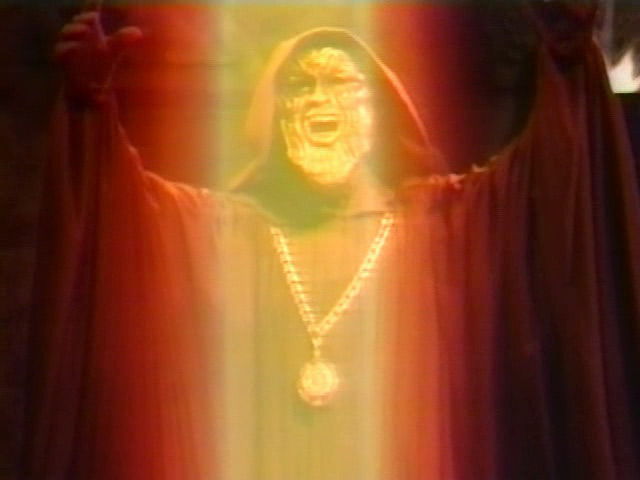There are a lot of nice elements in the Doctor Who episode The Masque of Mandragora
. Towards the beginning, we get a tour of the TARDIS, including the secondary control room, which the Doctor then begins using – making for a redecoration of the longstanding control room set, which the show would later return to. But it introduced the idea of changing the decor of the control room, and a very large interior to the TARDIS, all of which have been ongoing features on Doctor Who.
The episode focuses on the Doctor making a brief stop in the Mandragora Helix, and accidentally bringing energy from there to Earth. The Doctor and Sarah arrive in Renaissance Italy (50 years before Galileo), where an astrologer named Hieronymous (i.e. Jerome) speaks of “fate,” while the duke is skeptical and interested in a man in Florence who has arranged glass to make it possible to see the moon more closely, and has explored the possibility that the Earth orbits the sun. Hieronymous turns out to also be the high priest of the ancient Roman god Demnos (a god apparently made up for the purpose of this episode), and the cult of Demnos in turn is being used by the Mandragora Helix, a conscious astronomical entity which is trying to stop humans from spreading through the galaxy and becoming a rival power in their domain. And so they are going to try to eliminate Leonardo Da Vinci and others who come to celebrate Giuliani’s ascent to the dukedom – throwing the Earth back into another dark age.
I was struck, rewatching the episode, by the tension between the Doctor’s skepticism towards astrology, and the storyline in which an intelligent celestial body is in fact influencing affairs on Earth. This is a perennial tension on Doctor Who, as well as other science fiction shows: voiced skepticism towards the supernatural, combined with storytelling which in fact embraces elements of traditional mythological storytelling, but with a purportedly scientific explanation.
The episode is also the first one (I believe) in which the fact that the Doctor and his companions hear everyone speaking in their own language, even if they are in fact speaking Italian.














